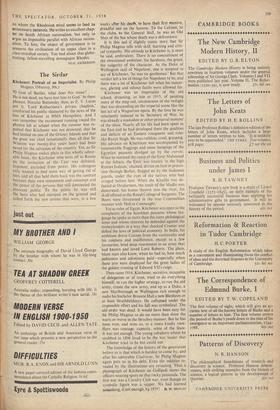The Sirdar
Kitchener: Portrait of an Imperialist. By Philip Magnus. (Murray, 30s.) '0 GOD of Battles, what does this mean? . . . He is not dead, we have lent him to God.' In these phrases, Horatio Bottomley then, as E. V. Lucas put it, 'Lord Rothermere's private chaplain,' comforted his public shattered by the news of the loss of Kitchener in HMS Hampshire. And I can remember the excitement running round the Physics lab at school when the rumour was re- ported that. Kitchener was not ,drowned; that he had landed on one of the Orkney Islands and that the great war chief (emotionally then all that Sir Winston was twenty-five years later) had been saved for the salvation of the country. Yet, as Sir Philip Magnus makes plain in this wholly admir- able book, the Kitchener who went off to Russia on the invitation of the Czar was defeated, impotent, excluded from power. His colleagues only wanted to find some way of getting rid of him, and all that held them back was the contrast between their own resentment and contempt and the power of the persona that still dominated the innocent public. To the public he was still the hero who had stamped on the ground and called forth the new armies that were, in a few weeks after his death, to have their first massive, dreadful test on the Somme. To the Cabinet, to the clubs, to the General Staff, he was an Old Man of the Sea whose death was a deliverance.
It is this sad if slightly comic story that Sir Philip Magnus tells with skill, learning and criti- cal sympathy. His attitude to Kitchener is, it must be said, ambivalent. There is no concealment of the obsessional ambition, the hardness, the greed, the vulgarity of the character. As the Duke of Wellington said of Napoleon, one is tempted to say of Kitchener, 'he was no gentleman.' But that verdict left a lot of things for Napoleon to be, and there was a lot of Kitchener left when his numer- ous, glaring and odious faults were allowed for.
Kitchener was an imperialist of the old school, dreaming, as late as 1915, of painting more of the map red, unconscious of the twilight that was descending on the imperial scene like the last act of a Wagnerian opera. By the time he was reluctantly induced to be Secretary of War, he was already a mastodon or other primeval monster of the slime. Nearly all his life had been spent in the East and he had developed there the qualities and defects of an Eastern conqueror and ruler like Ranjit Singh. He was ruthless, cruel, grasping. His advance on Khartoum was accompanied by innumerable floggings and some hangings of the Egyptian peasants dredged up by the corvie. When he stormed the camp of the Emir Mahmoud at the Atbara, the Emir was treated 'in the high Roman fashion,' chained, driven on foot in proces- sion through Berber, flogged on by the Sudanese guards, under the eyes of the natives who had cringed before him. Wh6n the Khalifa was de- feated at Omdurman, the tomb of the Madhi was desecrated, his bones thrown into the river, his skull offered to the Royal College of Surgeons. The Boers were threatened in the true. Cromwellian manner with 'Hell or Connaught.'
Yet as ruler of Egypt, Kitchener was open to the complaints of the humblest peasants whose lan- guage he spoke in more than the mere philological sense and whose interests he defended against the moneylenders in a way that shocked Cromer and defied the laws of political economy. In India, his ambition drove Curzon from the viceroyalty and his coldness and indifference, except to a few favourites, bred deep resentment in an army that had known and loved Lord Roberts. The plain, blunt man also knew, when he had to, how much politeness and adroitness paid—especially when these arts were displayed for the great ladies of the golden evening of Edward VII's reign.
Then came 1914, Kitchener, secretive, incapable of delegation or of trust, tried to do everything himself, to run the higher strategy, to run the old army, create the new army, end up as a Duke, a new Marlborough or Wellington rich enough to make his bachelor Broome Hall a new Blenheim or at least Strathfieldsaye. He collapsed under the impossible effort and his fall was symbolical. The old order was dead. It would have been easy for Sir Philip Magnus to do no more than show the warts or worse in the Strachey manner. But he has been won, and wins us, to a more kindly view. Here was courage. capacity, sense of the State. It was not enough. The young subaltern whom he snubbed in 1898 lived to be the war leader that Kitchener tried to be but could not. • The knowledge of the history of the generation before us is that which is hardest to come by; and after his admirable Gladstone, Sir Philip Magnus again puts us in his debt. Even the oddities re- vealed by the illustrations are revealing. Thus a photograph of Kitchener on Gallipoli shows the officers wearing spurs on that rocky peninsula. The first war was a Cavalry Club war, even though its symbolic figure was a sapper. We had learned something, if not enough, by 1939! D. W. BROGAN


































 Previous page
Previous page